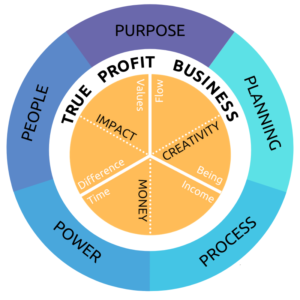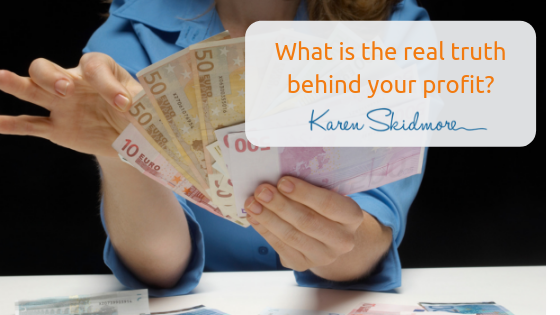For many of you who decide to start up a business, it isn’t the money that necessarily drives you above all else. However, making sales is a critical component to having a successful business. Without someone buying what it is you are selling, you have no business. Even a charity or not-for-profit organisation has to have an income to exist to do its work.
There’s often a lot of emotional baggage and over-thinking tied up with the process of sales and marketing, especially when money may not appear to be the primary driver. Feelings, beliefs, and thoughts about money and profit often create strong emotions and thinking around what you believe you are worth, the prices you charge and your ability to go out and sell.
You will have your own stories about what profit means to you.
Profiting can be viewed as a “bad” thing to do in business for a lot of people. I have heard many stories over the years from my clients about money; about how they base their behaviour on beliefs such as “I need to add more bonuses and get everything right before I put my offer out there”, “my clients wouldn’t pay those kinds of prices” or “I want my prices to be low enough for anyone to say yes”.
When you focus hard at making sales
The times that I have focused hard on making sales have been the unhappiest and most stressful months of running my business. I remember one period in particular when I decided to work with a sales mentor because I was frustrated with my inability to make enough money. I had convinced myself (and he had convinced me, too!) that he had the sales formula that would solve all my problems in just six weeks. He taught me a sales strategy that I now refer to as FOOB (F*%! Off Or Buy). The selling process meant that the offer I made on a call with a prospect was only available if the person decided to buy there and then. If they wanted to go away and think about it, that was OK but they wouldn’t get the special price I was offering to them. I was being taught to sell scarcity in a high-pressure sales environment so that I could make my sales targets.
I made my targets and I filled my programme, so you could say it worked. But I was miserable making my sales this way. It felt pressurised, the process didn’t align with my values and I soon decided to stop working with this particular mentor.
Each time I have found myself rising to the pressure of having to make money, it has rarely worked. Even when I have met my sales targets in this driven way, I didn’t seem to be any happier overall. My sales achievements often pushed me to up my game and increase my next month’s targets, I didn’t take the time to celebrate my successes and just raced on to the next idea or project. All this contributed to my burnout.
When you focus hard at doing anything but making sales
On the other end of the scale, there have been times that I have done anything but do the work to make the sales. When I first started up my business, I often used the phrase “I’m not doing this for the money”. I had stories going on in head such as “I’m just a mum who works from home” and “I need people to like me before they buy from me”. I was pretending to myself that money wasn’t important and these stories held me back. I felt incredibly uncomfortable when quoting my prices. I just hoped that my emails and blog posts would do the selling for me, rather than pick up the phone and speak to people directly (which frankly is still the simplest and easiest way to make sales today).
This would also happen during the times I was burning out; being knackered and brain fogged meant that my fears and doubts would have me spending my time re-writing my sales pages, creating pretty graphics, writing email autoresponders and posting updates on my social feeds. That’s all I felt I was capable of so I found myself busy for the sake of being busy because I didn’t have the energy to plan long term or think strategically about my business.
So when you focus hard to make sales, you are in danger of working against your values or lose sight of your purpose that can mean, over time, you burn out in the process. On the other end of the scale, if you aren’t connected with your purpose or your money stories are triggering your fears and doubts, your business has the danger of being nothing more than an expensive hobby.
What are you do?
Do we really have to sacrifice our creativity and purpose in order to make a profit?
What I have come to know now is that for you to fulfill your greatest potential and play your bigger game, your business needs to fuel three things: your creativity, your purpose and your financial goals. This is not an “either-or” choice you have to make. You can have a business that fulfills your purpose, allows you to have fun as well as make good money in the process.
A 6-figure business with a turnover of £250,000 may sound impressive, but when you see the business owner burnt out, unable to feel fulfilled or even pay themselves a decent income because their costs are so high, the True Profit of this business is low.
A business with half this turnover, but with the business owner working in flow and having decided that a £65,000 annual income is more than enough to give them what they want from life, the True Profit of the business may be considered high.
Everyone will have their own, unique True Profit figure and it’s important to recognise this. We often judge other people’s businesses from what we see externally; the number of people in the room at a conference or how many likes or comments they get on their Facebook posts. And then we use these judgments to benchmark our own success. But the external numbers only tell one part of the story.
Profit
Let’s dive into the topic of profit in more detail. If you look up the definition of profit, this is what you’ll find:
“The monetary surplus left to a producer or employer after deducting wages, rent, cost of raw materials, etc”
Now, I don’t know about you, but that definition is not terribly inspiring to me. When laid out like this, it’s easy to think that profit is best left for your accountant to sort out at the end of each year. Having a “monetary surplus” is hardly inspirational.
Even though I recognise the fact that making money is important, I’ve never been particularly motivated by numbers on a spreadsheet. In my early years, knowing what my profit was week in week out was never high on my agenda. I knew what my sales were (turnover) but never really bothered by what my “monetary surplus” was. They were even times where I would totally disregard the financial aspect of my business which, not surprisingly, did lead to the detriment of how much money I really did make. My sales may have been good but what this translated into profit and my personal income has been demotivating at times.
What does the word profit really mean?
A business like mine and yours is not just something we do; it’s not a job that we get hired for but a representation of who we are. No matter what you sell, you have so much of you wrapped up in it (your expertise, talents and intellectual property). This can make it hard to separate the pragmatic, monetary side of worth, with the worth that’s wrapped up so tightly in your heart, body, and soul.
This is why it’s interesting to look at the origins of the word profit because it has a completely different meaning to what we think of profit today. Go back to 1300 and the word profit comes from the old French “prufit, porfit”, meaning “benefit advantage”. If we go further back, the word profit comes from the Latin word “proficere”, which means “accomplish, make progress, be useful, do good, have success.”
Our modern-day economy has seemingly sucked the life-force out of the word. Profit is no longer associated with accomplishment and commitment to do good. The doingness of our business culture has morphed the word “profit” to give us a different version of success; a version that makes us feel we are never enough.
It’s time to change this. You, and all our micro-business and small business communities across the globe, have a huge combined economic power, as well as the ability to make our own choices in how we decide to grow our business, which in turn can change the way business impacts our planet and how we treat each other as human beings. Profit can once again mean that business is here to make progress, to be useful and does good.
That’s my bigger vision and my driving purpose for my business and the work that I do. But with as with most bigger visions, a mission such as this grows with one business at a time. So, let’s start with your business. Let’s dive into how you can bring these principles of True Profit Business into your business.
A new (and better!) way of doing business
The True Profit Business Model
We’ve established that financial profit is important; let’s not pretend otherwise. Without money flowing into your business, money can’t flow out. It’s a necessary energy to create growth. But take into account the hours you work, the effort you put in, the sacrifices you make, the stress that your business causes you … how does that financial figure translate into your health, wellness, happiness, time and impact that you make?
I believe that when you figure out how, when and where you want to work, get clear on your strengths and values, and design the right marketing systems, revenue streams and business model that fuels you, that this is when a True Profit Business Model can give you freedom to create, have an impact, as well make you money.

In the center of the True Profit Business Model are the three energies of money, creativity, and impact. It may not feel like it right now, but you have complete control over the choices of how each of these energies can work for you. Deciding on what these choices become your True Profit Compass, a navigation tool to help keep you centered on how your business works for you at each stage of your business growth journey. Your True Profit Compass evolves over time as you grow and evolve so it’s a tool you will want to review a few times a year and particularly before you create any next growth plan or make a decision to change the way you run your business.
Surrounding your True Profit Compass are the five True Profit Growth Pillars, which are there to support you at every stage of your growth. These pillars have to grow together because, as you can imagine, if even just one or two are not growing with you, you are going to have wobbly foundations for your business.
Over the coming weeks, I shall be sharing more about these five Growth Pillars and the True Profit Compass. My new book, True Profit Business, is coming out this September.
In the meanwhile, I’d love to know what insights you have this article so do comment below and share your thoughts on what profit really means to you.








